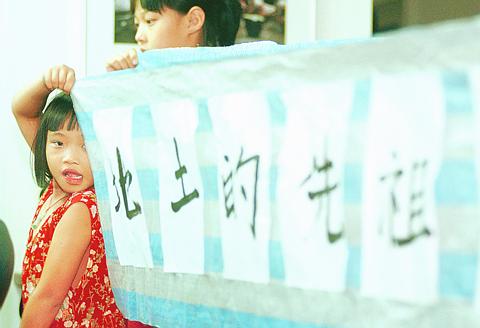A group of Aborigines petitioned the Cabinet's Council of Aboriginal Affairs yesterday for help in recovering land taken by the Ministry of National Defense in 1967.
The 45 petitioners, who include senior citizens, middle-aged people and children, produced evidence documenting that they were the original owners of 77.402 hectares in Hoping township (
"President Chen Shui-bian (陳水扁) has shown his concern for Aboriginal land rights and has committed the government to a policy of returning ancestral lands to Aborigines," the council's chairman, Yohani Isqaqavut (尤哈尼), told the petitioners. "During my term, I will endeavor to see that Aboriginal land rights are respected."

PHOTO: GEORGE TSORNG, TAIPEI TIMES
Chin Su-mei (
The ministry used the land to set up barracks and training camps, Chin said, and it offered "other land as compensation, but they never stuck to the deal."
Another petitioner, Hsu Wan-fu (
"Since the ministry is not using the lands, why not return them to us?" Hsu said. "It's my ancestors' land. I have to take it back."
The defense ministry stopped using some of the land in 1998 and agreed to return it, the petitioners said, but Hoping township officials failed to inform the original owners about meetings with the ministry to discuss transfer of the lands.
The petitioners said township officials located just two of the original owners and returned three plots of land to them. The remaining property was taken over by the township.
The Aborigines asked the council to help them recover 7.402 hectares currently under the township's control, and a 70-hectare plot that is still being used by the defense ministry's Yueh Wu Camp (岳武營區).
In response to the request, Yohani Isqaqavut told the petitioners, "I will continue with my efforts to campaign for land rights and will do so earnestly."
Aboriginal activists, mainly from the Presbyterian Church in Taiwan where Yohani Isqaqavut was once a leader, launched campaigns named "Return Our Lands" in 1989, 1990 and 1992.
The main challenge facing Aborigines is producing documents that show they were the original owners of land.
Mayaw Kumud (
Mayaw Kumud served a one-year jail term in 1995 for breaking laws against assembly and demonstrations during the 1992 "Return Our Land" campaigns.
"Many activists from that time have entered the new government. We won't let go of [the land rights issue] easily," Mayaw Kumud said.

INVESTIGATION: The case is the latest instance of a DPP figure being implicated in an espionage network accused of allegedly leaking information to Chinese intelligence Democratic Progressive Party (DPP) member Ho Jen-chieh (何仁傑) was detained and held incommunicado yesterday on suspicion of spying for China during his tenure as assistant to then-minister of foreign affairs Joseph Wu (吳釗燮). The Taipei District Prosecutors’ Office said Ho was implicated during its investigation into alleged spying activities by former Presidential Office consultant Wu Shang-yu (吳尚雨). Prosecutors said there is reason to believe Ho breached the National Security Act (國家安全法) by leaking classified Ministry of Foreign Affairs information to Chinese intelligence. Following interrogation, prosecutors petitioned the Taipei District Court to detain Ho, citing concerns over potential collusion or tampering of evidence. The

NEGOTIATIONS: Taiwan has good relations with Washington and the outlook for the negotiations looks promising, Minister of Economic Affairs J.W. Kuo said Taiwan’s GDP growth this year is expected to decrease by 0.43 to 1.61 percentage points due to the effects of US tariffs, National Development Council (NDC) Minister Paul Liu (劉鏡清) said at a meeting of the legislature’s Economics Committee in Taipei yesterday, citing a preliminary estimate by a private research institution. Taiwan’s economy would be significantly affected by the 32 percent “reciprocal” tariffs slapped by the US, which took effect yesterday, Liu said, adding that GDP growth could fall below 3 percent and potentially even dip below 2 percent to 1.53 percent this year. The council has commissioned another institution

NEGOTIATIONS: The US response to the countermeasures and plans Taiwan presented has been positive, including boosting procurement and investment, the president said Taiwan is included in the first group for trade negotiations with the US, President William Lai (賴清德) said yesterday, as he seeks to shield Taiwanese exporters from a 32 percent tariff. In Washington, US Trade Representative Jamieson Greer said in an interview on Fox News on Thursday that he would speak to his Taiwanese and Israeli counterparts yesterday about tariffs after holding a long discussion with the Vietnamese earlier. US President Donald Trump on Wednesday postponed punishing levies on multiple trade partners, including Taiwan, for three months after trillions of US dollars were wiped off global markets. He has maintained a 10 percent

TRADE: The premier pledged safeguards on ‘Made in Taiwan’ labeling, anti-dumping measures and stricter export controls to strengthen its position in trade talks Products labeled “made in Taiwan” must be genuinely made in Taiwan, Premier Cho Jung-tai (卓榮泰) said yesterday, vowing to enforce strict safeguards against “origin laundering” and initiate anti-dumping investigations to prevent China dumping its products in Taiwan. Cho made the remarks in a discussion session with representatives from industries in Kaohsiung. In response to the US government’s recent announcement of “reciprocal” tariffs on its trading partners, President William Lai (賴清德) and Cho last week began a series of consultations with industry leaders nationwide to gather feedback and address concerns. Taiwanese and US officials held a videoconference on Friday evening to discuss the